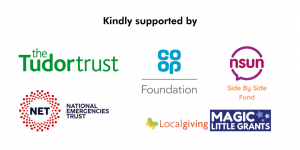How can you grieve when nobody knows that you’re grieving?
Lately, as a queer person, I’ve been thinking a lot about how coming out is a concept that applies to both addressing your sexuality to other people, and grief. If you aren’t straight or cisgender, you will have to spend your life repeatedly coming out to people – family, friends, friends, colleagues, acquaintances.
Every time you meet someone new, and you decide it’s something you are comfortable with them knowing, you have to do it again.

We live in a world that, largely, assumes heteronormativity. The same can be said, in a way, of grief. If it is not an immediately visible loss, one that doesn’t crop up naturally in a conversation, then you will have to be the one to haul it out into the open yourself every time you find yourself meeting people who you decide would benefit from knowing this part of you. You have to come out again and again.
Unless, of course, you are like me, and decide to go over a decade without telling anyone.
That is not an exaggeration, by the way. My cousin Tom died of a brain tumour when I was 10, nearly 11 years old. On the evening of his funeral, after we’d finally returned home, bleak and exhausted, we received a phone call telling us his younger sister, Briony, had just suffered an asthma-induced heart attack. She was also dead.
My school was informed of what had happened, but not the majority of my classmates. The few who knew couldn’t really comprehend it, I don’t think, so it sank away into obscurity. The next new person I told fully and explicitly about exactly what had happened was a university counsellor when I was nearly 22, over ten years later.
I’ve often questioned why I didn’t tell anyone for so long – not friends, not partners, I refused even to discuss it with my parents or siblings. I think part of it comes down to a natural introversion on my part, and generally finding talking about my feelings in any capacity to be lightly mortifiying.
Another large factor is our wider cultural approach to grief. It took me a long time to realise that the messaging I had received about what the process of grief should be like was completely wrong; I believed that at first I would feel it, and then one day, I simply wouldn’t any more. When it continued to persist, I found this to be unbearably wrong, abhorrent even, so I hid it away, in the hopes I could forget about it.
In all fairness to myself, I got quite good at it.
But the real problem, I’ve realised, is the hidden nature of my grief. It’s difficult to hide the death of a parent, sibling, or child. When you meet new people, such as when changing school, going to university, people ask about your immediate family. Grandparents are even more likely to come up, and people are generally gently cautious when enquiring, sensitive in case someone has lost their grandparents. Who meets someone new and asks how many cousins they have? Some have dozens, some none at all.
You continue to grow up, start new jobs, meet new friends, colleagues and loved ones, and each time you look for an opening to tell them, only there isn’t one. It often feels like there is a huge gaping hole eaten out of the side of my torso, only it’s underneath my clothes, so no one can see it. The subject is vague and cloudy. It never came up, so I never told anyone.
As I found out eventually, grief does not go away – it will wait. It is the most patient thing in the world. When I finally did go to my university counsellor and explain what had happened, and how I’d reached a point where I couldn’t stop thinking about it literally all the time, it didn’t magically fix everything. It didn’t mean my journey with loss was over – rather, I’d finally started on it properly.
It’s not a pleasant journey, but it feels better than being stuck in the no-man’s-land of deliberately concealed loss.
I hasten to add that I am by no means an open book now – the majority of people in my life still have no idea about this monumental event. But beginning to take the baby steps of letting my cousins’ deaths occupy their own place in my life feels infinitely better than praying the hurt goes away on its own.
Pain does not get smaller, your life just grows around it, and knowing others might also have their own hidden losses and griefs that the world overlooks daily adds a different layer to everything I approach; for better or worse.
Many griefs remain hidden, and can feel impossible to bring up, even as they fill every part of you inside. So to all fellow griefsters, and especially those with hidden losses – I see you.
Holly Redshaw
If you’d like to share your story on our blog, email blog@letstalkaboutloss.org and we’d love to publish it.

